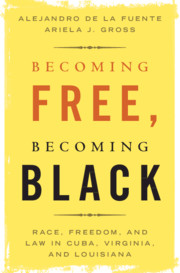Book contents
- Becoming Free, Becoming Black
- Studies In Legal History
- Becoming Free, Becoming Black
- Copyright page
- Contents
- Figures and Tables
- Preface
- Abbreviations
- Introduction
- Chapter 1 “A Negro and by Consequence an Alien”
- Chapter 2 The “Inconvenience” of Black Freedom
- Chapter 3 “The Natural Right of All Mankind”
- Chapter 4 “Rules … for Their Expulsion”
- Chapter 5 “Not of the Same Blood”
- Conclusion
- Notes
- Index
Chapter 5 - “Not of the Same Blood”
Policing Racial Boundaries, 1830–1860
Published online by Cambridge University Press: 16 January 2020
- Becoming Free, Becoming Black
- Studies In Legal History
- Becoming Free, Becoming Black
- Copyright page
- Contents
- Figures and Tables
- Preface
- Abbreviations
- Introduction
- Chapter 1 “A Negro and by Consequence an Alien”
- Chapter 2 The “Inconvenience” of Black Freedom
- Chapter 3 “The Natural Right of All Mankind”
- Chapter 4 “Rules … for Their Expulsion”
- Chapter 5 “Not of the Same Blood”
- Conclusion
- Notes
- Index
Summary
Chapter Five continues the discussion of slaveholders' efforts to limit the rights and standing of free blacks. It looks closely at the 1850s, when Louisianan and Virginian slaveholders built a white man’s democracy in which whiteness was the sole basis for political power and free people of color could never be citizens. The legislatures of Virginia and Louisiana sought to isolate and degrade people of color in every realm of the public sphere, shutting down their institutions, such as churches and schools. In Cuba, where the colonial state could not afford to alienate the free black population and where black freedom was not linked to white man’s democracy, free people of color managed to withstand the slaveholders’ assault on their traditional rights and institutions. Regulations based on race rather than status predictably led to litigation over racial identity, and the chapter compares trials of racial identity and cases of interracial marriage. Whereas courts in the U.S. drew tight connections between whiteness and the possibility of citizenship, the Cuban courts held out the possibility that a person of color could be honorable and marry across the color line.
Keywords
- Type
- Chapter
- Information
- Becoming Free, Becoming BlackRace, Freedom, and Law in Cuba, Virginia, and Louisiana, pp. 178 - 218Publisher: Cambridge University PressPrint publication year: 2020

